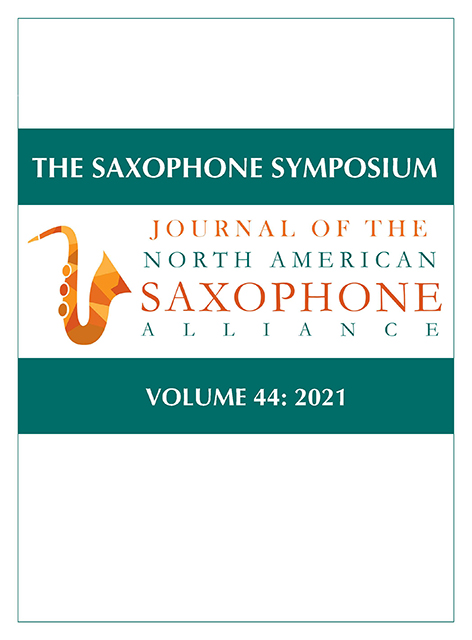Book contents
- Frontmatter
- Contents
- The Saxophone Symposium
- Nasa Executive Committee
- Notice to Contributors
- Financial Reports
- Improving the Quality of Saxophone Quartet Rehearsals: Interviews with Members of Kenari, h2, Sinta, and Fuego Quartets
- The Red Saxophone: Hanns Eisler and “Applied Music” in Weimar Berlin
- Gender Representation at North American Saxophone Alliance Biennial Conferences from 2008 through 2020
- The Raschèrian Approach: Cultivating the Elastic Bow of Articulation
- John Sampen: Biography of an American Saxophone Pioneer
- Randall Hall: Oracle
- Contributor Biographies
Randall Hall: Oracle
Published online by Cambridge University Press: 14 July 2023
- Frontmatter
- Contents
- The Saxophone Symposium
- Nasa Executive Committee
- Notice to Contributors
- Financial Reports
- Improving the Quality of Saxophone Quartet Rehearsals: Interviews with Members of Kenari, h2, Sinta, and Fuego Quartets
- The Red Saxophone: Hanns Eisler and “Applied Music” in Weimar Berlin
- Gender Representation at North American Saxophone Alliance Biennial Conferences from 2008 through 2020
- The Raschèrian Approach: Cultivating the Elastic Bow of Articulation
- John Sampen: Biography of an American Saxophone Pioneer
- Randall Hall: Oracle
- Contributor Biographies
Summary
In this album, saxophonist/composer Randall Hall offers an album-length exploration of the occult world of the ancient Greeks. These pieces for saxophone and electronics are meant to delve into the concepts of ritual and the act of seeking for the unknowable. In the first piece on the album, Vosces Mysticae, a slowly oscillating drone underpins an articulated moto-perpetuo melody in the soprano. The saxophone gradually moves farther into a microtonal world before briefly exploring a contemplative melody, finally moving back toward driving rhythms.
The second piece, Mithras Liturgy for electronics alone, incorporates an ancient discussion of an occult Greek ritual. The work unfolds first as a recording of Dr. Mischa Hooker (a professor of classics who is a colleague of Hall) reading the words of the ritual in the original Greek. Hooker’s voice is gradually warped and manipulated with faint underpinnings of tones. Gradually, dark layers of synthesized sound take over, until the voice is reintroduced, this time as disembodied portions of speech.
For the next piece, When I Walked the Dark Road of Hades, Hall takes inspiration from the ancient Greek tale of Orpheus’s pursuit of his love Eurydice into the underworld to earn her release from death. The work, for solo soprano, uses an intense microtonal system that is meant to suggest what ancient Greek music may have sounded like. This through-composed piece conjures the image of the great mythical musician himself singing of his adventures and his sorrow. Hall’s performance of this work is highly moving and compelling.
The latter half of the album is taken up by Hall’s Chaldean Oracles for alto and electronics, based upon prophetic texts from the second century AD. At the beginning of each movement, Hooker recites a different poem from a collection attributed to a father and son team of Julian the Chaldean and Julian the Theurgist. Each movement seeks to imagine the world of the occult rituals surrounding these prophetic writings. In the first movement, “Oracle 112,” sparse electronics undergird a multiphonic and slap-tongue filled alto part. In the second movement, “Oracle 115,” the saxophone plays a bouncing, microtonal dance against faint echoes and drones in the electronics.
- Type
- Chapter
- Information
- The Saxophone SymposiumJournal of the North American Saxophone Alliance, pp. 92 - 103Publisher: Boydell & BrewerFirst published in: 2023



